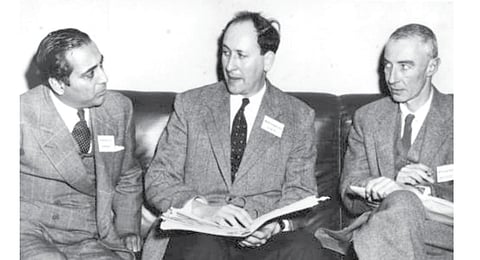

CHENNAI : With Christopher Nolan’s upcoming film, Oppenheimer making waves in the world of cinema, there has been an elevated interest in learning more about its titular character J Robert Oppenheimer. He is more widely known as the ‘father of the atomic bomb’, which one might assume is a title Oppenheimer would not be too fond of if they knew anything about him. After the first test of the bomb, its destruction left a disastrous impact on the eminent scientist to the point where he quoted the line ‘Now I am become Death, the destroyer of worlds’ from the Bhagavad Gita. Wars have led members of our species to create things they would come to regret in horror.
Outside of leading the Manhattan Project (that created the atomic bomb), not much is known about Oppenheimer in the present pop-cultural ethos. His life beyond World War II is largely left to only the ones curious enough to take a peek. One such veiled aspect of Oppenheimer’s post-war life was his brief friendly relationship with eminent Bengalurean and nuclear physicist Homi J Bhabha.
“In all probability Bhabha met Oppenheimer after the war had ended and the two became good friends. This was hardly surprising since Oppenheimer, like Bhabha, was a highly cultured man. He had studied Sanskrit and was also conversant with Latin and Greek. He was interested in poetry and the fine arts. His father owned van Gogh paintings. Bhabha used to dine with Oppenheimer and his wife Katherine (Kitty) when he visited New York,” shares Bakhtiar Dadabhoy, author of the 2023 biography Homi J. Bhabha: A Life.
In 1954, Oppenheimer fell from grace in the eyes of the United States of America when his security clearance was taken away after the Atomic Energy Commission (AEC) alleged that he had ties to communism. Both his wife Katherine and brother Frank Oppenheimer (who was a well-respected physicist himself) were involved with/members of the American Communist Party.
“When Oppenheimer lost his security clearance in 1954, it was presumably on Bhabha’s intervention that he was invited by Nehru on more than one occasion to visit India, and even immigrate if he so wished. Oppenheimer declined because he felt that it would not be proper for him to leave the US until he had been cleared of all charges. He feared that permission would not only be refused but also that it would only increase suspicion about him,” says Dadabhoy.
While the two did not often meet, the ‘father of the atomic bomb’ and the ‘father of the Indian nuclear programme’ publicly supported one another when necessary. “Bhabha in a meeting with then US Secretary of State John Foster Dulles, had told him that his impression of Russian science was quite favourable. Dulles said that this did not surprise him since he thought they were a ‘materialist and godless civilisation’ whereas they (the Americans) were ‘religious and spiritual’. Bhabha must have at some time told this to Oppenheimer who narrated this in a press conference in Tokyo in September 1960. He said that as long as a leading politician, with the destiny of the world in his hands, could talk such blasphemous rubbish, ‘we are not making good contact with politicians’,” says Dadabhoy.
LANDMARK MOVIE
The upcoming film Oppenheimer is scheduled to release on July 21 in India. Sagar Puranik, the national award-winning director is greatly looking forward to the film’s release. “I haven’t yet met a person who is not a fan of Nolan. The amount of live-action he does in his films is incredible. He hardly ever relies on CGI. I love watching such films. I am sure Oppenheimer is going to be one of those landmark films that people keep talking about in the future,” he says adding that The Dark Knight (2008) is his favourite Nolan film.